#oracleebusinesssuite
Explore tagged Tumblr posts
Text
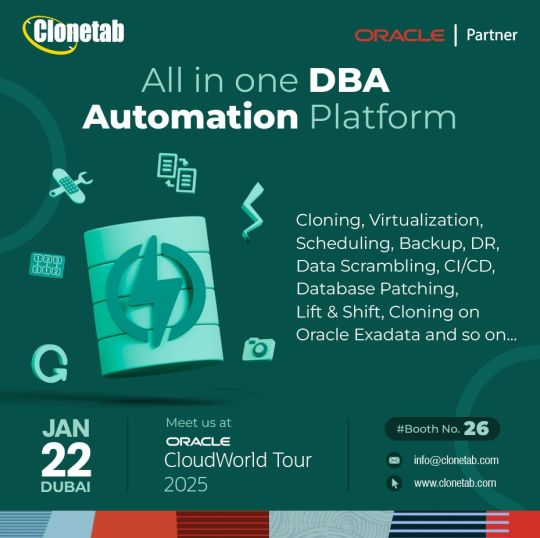
Join Clonetab Inc. at Oracle CloudWorld Tour Dubai! We’re excited to announce our participation in the Oracle CloudWorld Tour Dubai on January 22, 2025, at the Dubai World Trade Centre (DWTC)! Visit us at Booth #26 www.clonetab.com What to Look Forward To: - Explore our powerful DBA Automation Platform – Clonetab, designed to transform database operations. - Experience our game-changing Rapid Cloning solutions, streamlining ERP and database processes. - Learn about our robust Disaster Recovery (DR) and Backup solutions, ensuring unparalleled resilience and efficiency. Our experts will be on hand to demonstrate how Clonetab’s Advanced Automation platform for DBA activities simplifies and accelerates many of the DBA tasks like Application & Database cloning while securing your data with advanced DR/Backup strategies. Let’s connect and redefine database administration together. See you at Booth - 26
#OracleCloudWorldTour#Dubai#Clonetab#DBAAutomation#RapidCloning#DisasterRecovery#DataManagement#Oracle#Database#OracleEBS#PeopleSoft#OracleeBusinessSuite
0 notes
Text

Prantek Academy – Your Path to Success with Oracle EBS R12 Financials! With 15 years of experience, Prantek Academy offers comprehensive training in Oracle EBS R12 Financials (E-Business Suite), designed to equip you with the skills needed for success. Our expert instructors provide hands-on learning, and we offer a 100% placement guarantee to ensure your career growth!
#OracleEBSR12#EBSR12Financials#OracleEBusinessSuite#OracleEBSTraining#OracleFinancialsTraining#EBusinessSuiteTraining#OracleEBS#EBSFinancialsCourse#OracleEBSR12Training#OracleERP#HighLevelTraining#AdvancedCoursework#SpecializedEducation#CareerAdvancement#AdvancedEducation#AdvancedKnowledge#ProfessionalCourses
0 notes
Text
Oracle E-Business Suite With Google Cloud Cortex Framework
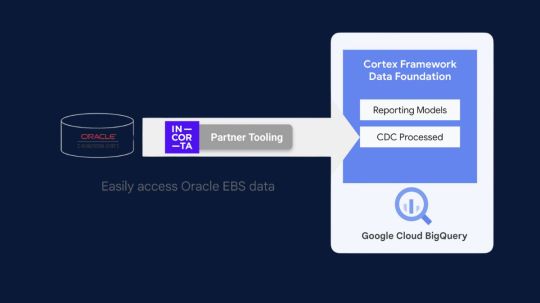
Use Google Cloud Cortex Framework to quickly integrate Oracle E-Business Suite insights.
Organizations cannot afford to wait weeks or months for vital enterprise data in the fiercely competitive market of today. It is now essential to be able to quickly obtain actionable insights on the order-to-cash process and other key business operations.
Why is this so urgent? As a result of visibility, companies can:
Watch for emerging trends in sales: Prioritize revenue at risk, identify high-performing items, and identify slow-moving sales channels.
Monitor orders, foresee possible delays, and notify clients at every stage of the delivery process to proactively manage delivery performance.
Take control of invoicing and billing: With timely and accurate data, you can reduce invoice errors, shorten payment processes, and enhance cash flow.
It gets crucial at this point to integrate the ERP system seamlessly. To gain the insights required to succeed, you must dismantle data silos and establish connections between key business processes. We’re thrilled to share the debut of Google Cloud’s streamlined data integration and analytics content for Oracle E-Business Suite (EBS) to aid in hastening this process!
What is Oracle E-Business Suite?
Organizations may improve performance, cut expenses, and make smarter decisions using the Oracle E-Business set, an integrated set of business software. Supply chain management, advanced procurement, financial management, human capital management, supply chain management, value chain planning, and value chain execution are among the problems that products address.
Oracle E-Business Suite applications
In addition to boosting productivity and satisfying the needs of contemporary mobile users, Oracle E-Business Suite supports the changing business models. With the support of Oracle E-Business Suite, which has a thirty-year history of innovation, you can take advantage of all the advantages of Oracle Cloud while receiving new application functionality and enhanced capabilities from current features.
The Oracle E-Business Suite powers the main business processes of thousands of enterprises worldwide. Oracle’s main focus areas for its ongoing suite investment are functional advancements, mobility, UI modernization, and operational efficiency. Oracle is also giving you access to continuous improvements in cloud infrastructure and complimentary SaaS apps, enabling you to maximize your Oracle E-Business Suite environments with increased capabilities and useful coexistence methods.
Oracle E-Business Suite users can benefit from a single, all-inclusive solution from Oracle Cloud ERP, which gives finance the adaptability and creativity it needs to innovate quickly.
Oracle Cloud: Utilize Oracle E-Business Suite
Oracle Cloud is the optimal environment for using Oracle E-Business Suite. Automated and scalable cloud infrastructure can help you save costs, increase productivity, and adapt to changing business needs.
Accelerate Oracle EBS integration
Numerous industries and businesses have embraced Oracle EBS as their ERP solution, which produces vital business data required to carry out essential business operations. In order to gain new insights and value, it is now simple to combine operational data from Oracle EBS with other enterprise data into a single, scalable data foundation in BigQuery with Google Cloud Cortex Framework.
With this release, the time, effort, and expense associated with integrating Oracle EBS with BigQuery are eliminated, and it offer analytical data models and Looker-compatible visualization templates to initiate order-to-cash operational insights. These insights include the option to:
Recognize the success of your sales by business unit, product category, and sales order channel.
Monitor order fulfillment performance, including order cycle times overall and on-time and in-full KPIs, to have a deeper understanding of fulfillment effectiveness.
Evaluate billing, invoicing, and accounts receivable data, including Day Sales Outstanding (DSO) and past-due payments, to analyze unpaid invoices.
Google Cloud collaboration with Incorta allows it to transfer Oracle data into specified Cortex Framework data models, which are now accessible in BigQuery, thus speeding up the process of data integration and processing.
Customers of Google Cloud and Oracle EBS can now enjoy lower costs and faster business insights and outcomes by utilizing this unified offering, which eliminates the requirement for custom data input and modeling solutions.
A basis for originality
Cortex Framework now offers an enhanced enterprise AI and analytics base that can enable faster time to value with its improved support for Oracle E-Business Suite. This product expands upon the Cortex Framework data base, which is currently offered for YouTube (with DV360), Salesforce, SAP, Meta, TikTok, Google Ads, Campaign Manager 360 (CM360), Google Analytics (GA4), and other platforms.
Read more on Govindhtech.com
#OracleEBusinessSuite#ERPsystem#Supplychain#OracleCloud#SaaS#BigQuery#News#technews#technology#technologynews#technologytrends#govindhtech
0 notes
Text
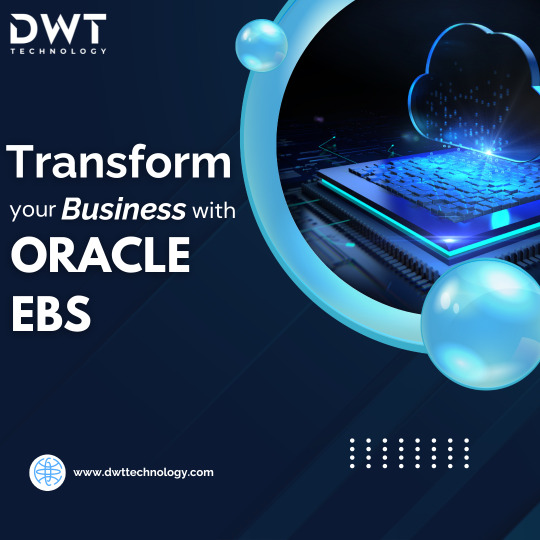
#OracleEBSImplementation#OracleEBSMigration#OracleEBSConsulting#OracleEBSTips#OracleEBSFeatures#OracleEBSTraining#OracleEBSCloud#OracleEBSSupport#OracleEBSExperts#OracleEBSServices#OracleEBSIntegration#OracleEBSSolutions#OracleEBSUpgrade#OracleEBSSoftware#OracleEBSAnalytics#OracleEBS#OracleEBusinessSuite#OracleEBSupport#OracleERP#OracleApplications#OracleTech#OracleSolutions#OracleIntegration#OracleConsulting#OracleUpdates
0 notes
Text
Performance tuning for Oracle EBS provides a seamless user experience, optimizes resource utilization, supports business growth, and ensures system availability.
0 notes
Text
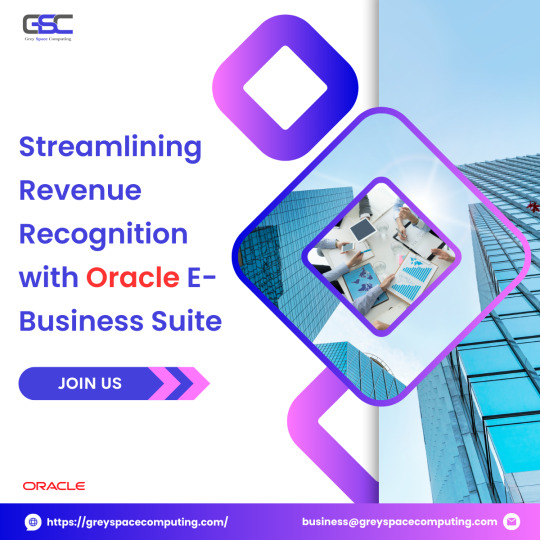
🚀 Master the art of revenue recognition! 📊 Explore seamless solutions with Oracle E-Business Suite to streamline and optimize your financial processes. Unlock growth and efficiency! 💼💡 🚀 Boost profits effortlessly with Oracle EBS! 💡 Optimize revenue recognition in a snap. 🌐 Seamless financial processes for success! 🌐 Learn more: https://greyspacecomputing.com/oracle-erp-solution/ 📧 Email: [email protected]
#Oracle #oracleEBS #Finance #BusinessGrowth #greyspacecomputing #oracleebusinesssuit #reducedcost #productivity #cloudsolutions #clouderp #cloudapplications #oraclepartner #odi #odilife #oracleodi #oracleerpcloud #oraclehcm #oraclehcmcloud #Saudi #Dubai #India #Kuwait #Qatar
1 note
·
View note
Text
Top 6 Ways to Keep Employees from Leaving their Job

#OracleEPM#Accountreconciliation#bigdataanalytics#ServiceOrientedArchitecture#OracleERP#HumanCapitalManagement#OracleHCM#OracleCloudInfrastructure#OracleExadata#OracleHCMCloud#ERPcloud#OracleeBusinessSuite#GlobalHR#HyperionFinancialManagement#OracleEPMCloud#Oracleanalytics#bigdatasolutions#OracleIDCS#OracleFusionHCM#OracleIAM#OracleGoldPartner#SOAsuite#NetSuiteERPsoftware#AccountReconciliationManager#hcmcloudoracle#hcmcloud#integrationcloudoracle#epmoracle#oraclecloudanalytics#oraclecloudlogo
0 notes
Link
Advantage of Oracle e-business suite:
· Oracle Database is the biggest USP of Oracle ERP is that it is based on Oracle Database.
· As far as the component of the suite itself is concerned Oracle Financials is a market leader
· Oracle Apps UI have two flavors – The Oracle Forms and the Oracle Self Service Application (HTML).
0 notes
Link
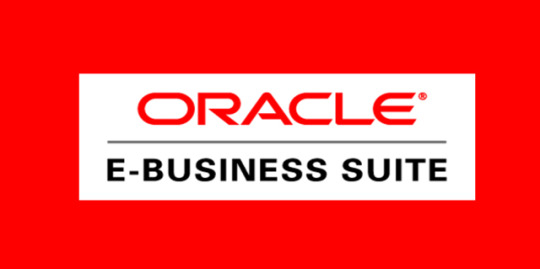
0 notes
Text
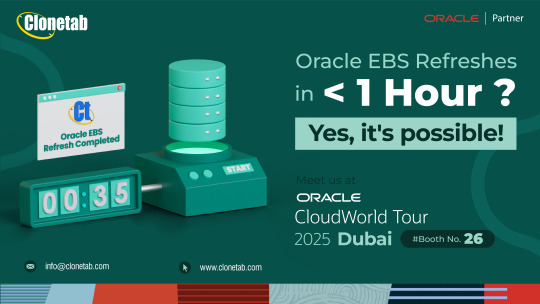
𝗝𝗼𝗶𝗻 𝗖𝗹𝗼𝗻𝗲𝘁𝗮𝗯 𝗜𝗻𝗰. 𝗮𝘁 𝗢𝗿𝗮𝗰𝗹𝗲 𝗖𝗹𝗼𝘂𝗱𝗪𝗼𝗿𝗹𝗱 𝗧𝗼𝘂𝗿 𝗗𝘂𝗯𝗮𝗶!
We’re excited to announce our participation in the 𝗢𝗿𝗮𝗰𝗹𝗲 𝗖𝗹𝗼𝘂𝗱𝗪𝗼𝗿𝗹𝗱 𝗧𝗼𝘂𝗿 𝗗𝘂𝗯𝗮𝗶 on January 22, 2025, at the 𝗗𝘂𝗯𝗮𝗶 𝗪𝗼𝗿𝗹𝗱 𝗧𝗿𝗮𝗱𝗲 𝗖𝗲𝗻𝘁𝗿𝗲 (DWTC)!
𝗩𝗶𝘀𝗶𝘁 𝘂𝘀 𝗮𝘁 𝗕𝗼𝗼𝘁𝗵 #𝟮𝟲 www.clonetab.com
𝗪𝗵𝗮𝘁 𝘁𝗼 𝗟𝗼𝗼𝗸 𝗙𝗼𝗿𝘄𝗮𝗿𝗱 𝗧𝗼:
Explore our 𝗽𝗼𝘄𝗲𝗿𝗳𝘂𝗹 𝗗𝗕𝗔 𝗔𝘂𝘁𝗼𝗺𝗮𝘁𝗶𝗼𝗻 Platform – Clonetab, designed to transform database operations.
Experience our game-changing 𝗥𝗮𝗽𝗶𝗱 𝗖𝗹𝗼𝗻𝗶𝗻𝗴 𝘀𝗼𝗹𝘂𝘁𝗶𝗼𝗻𝘀, streamlining ERP and database processes.
Learn about our robust 𝗗𝗶𝘀𝗮𝘀𝘁𝗲𝗿 𝗥𝗲𝗰𝗼𝘃𝗲𝗿𝘆 (DR) and 𝗕𝗮𝗰𝗸𝘂𝗽 𝘀𝗼𝗹𝘂𝘁𝗶𝗼𝗻𝘀, ensuring unparalleled resilience and efficiency.
Our experts will be on hand to demonstrate how 𝗖𝗹𝗼𝗻𝗲𝘁𝗮𝗯’𝘀 𝗔𝗱𝘃𝗮𝗻𝗰𝗲𝗱 𝗔𝘂𝘁𝗼𝗺𝗮𝘁𝗶𝗼𝗻 platform for DBA activities simplifies and accelerates many of the DBA tasks like 𝗔𝗽𝗽𝗹𝗶𝗰𝗮𝘁𝗶𝗼𝗻 & 𝗗𝗮𝘁𝗮𝗯𝗮𝘀𝗲 𝗰𝗹𝗼𝗻𝗶𝗻𝗴 while securing your data with 𝗮𝗱𝘃𝗮𝗻𝗰𝗲𝗱 𝗗𝗥/𝗕𝗮𝗰𝗸𝘂𝗽 strategies.
Let’s connect and redefine database administration together. See you at 𝗕𝗼𝗼𝘁𝗵 - 𝟮𝟲
#OracleCloudWorldTour#Dubai#Clonetab#DBAAutomation#RapidCloning#DisasterRecovery#DataManagement#Oracle#Database#OracleEBS#PeopleSoft#OracleeBusinessSuite
0 notes
Text

🚀 Free Live Webinar on #DataScrambling
Registration Link: https://lnkd.in/geZv7Bkr
Are you ready to revolutionize your data security strategy?
Join us for an exclusive webinar where we'll showcase Clonetab Advanced-Data Scrambling (CT-ADS) — the game-changing solution for managing sensitive data across Oracle e-Business Suite, SAP, and major #databases like #OracleDatabase, #MySQL, and #PostgreSQL.
💡 What You’ll Learn:
🔹 What is CT-ADS and how it supports compliance with tailored algorithms.
🔹 The unparalleled speed and efficiency of scrambling millions of rows in minutes.
🔹 Simplified and secure operations designed to safeguard your sensitive data.
📽️ Live Demo: Watch CT-ADS scramble 1 million rows in under 30 minutes, showcasing its unmatched speed and precision.
🗓️ When:
📅 Saturday, December 13, 2024
🕐 11:00 AM - 12:00 PM (PST)
🎙️ Meet Our Speakers:
Venkat Meka: CEO, Clonetab Inc. | ERP & DBA automation leader with over 20 years of expertise.
Baji Munnisa Shaik: Senior Development Manager, Clonetab Inc. | Innovative Java solutions expert.
📌 Reserve Your Spot Today: https://lnkd.in/geZv7Bkr
Don't miss this opportunity to see CT-ADS in action and discover how it can transform your #DataSecurity and compliance.
#Webinar#CTADS#Clonetab#ERP#Oracle#SAP#OracleEBS#OracleEBusinessSuite#DatabaseAdminstrator#DBA#DataMasking#EBS
0 notes
Text
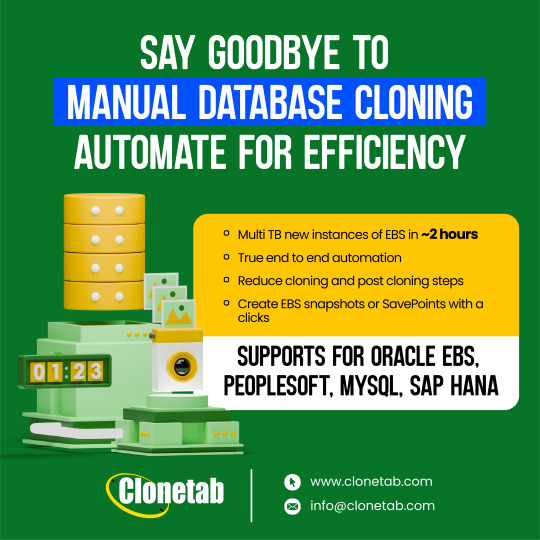
Stop Manual and go with Automation Clone your Multi-TB new instance of Oracle EBS in approximately 2 hours.Visit for more info: https://clonetab.com/ctclone/
#OracleEBusinessSuite#Oracle#OracleEBS#database#dataprotection#databasecloning#oracleEBScloning#clonetab
0 notes
Text
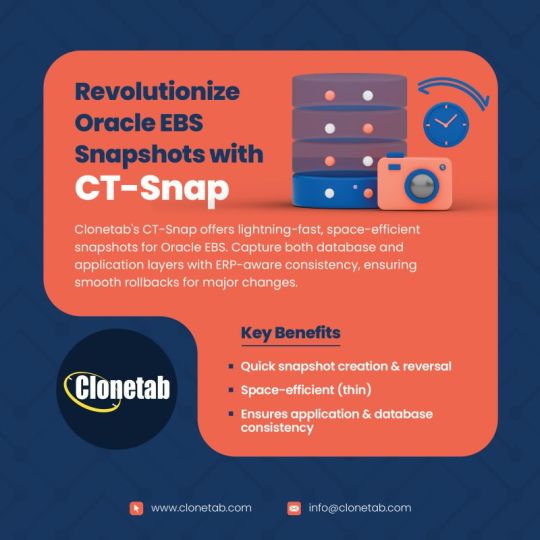
CT-Snap is Clonetab’s ERP application-aware technology. It captures both application and database snapshots. Easily revert to any snapshot in minutes after a major change with just a few clicks! www.clonetab.com/ctsnap
0 notes
Text
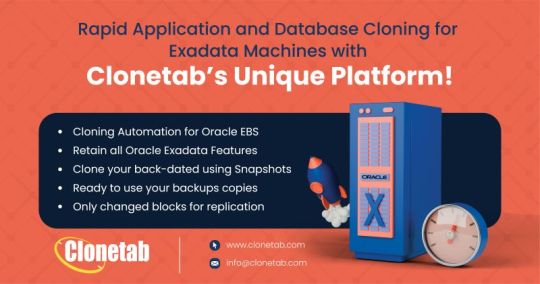
0 notes
Text
Oracle E-Business Suite (EBS) offers a comprehensive suite of integrated business applications that can handle several business processes in your organization. When planning an Oracle EBS upgrade, it is essential to follow a structured methodology to ensure a smooth and successful transition.
0 notes